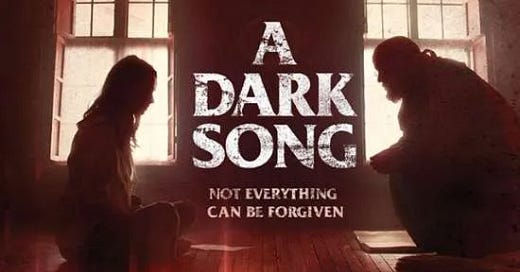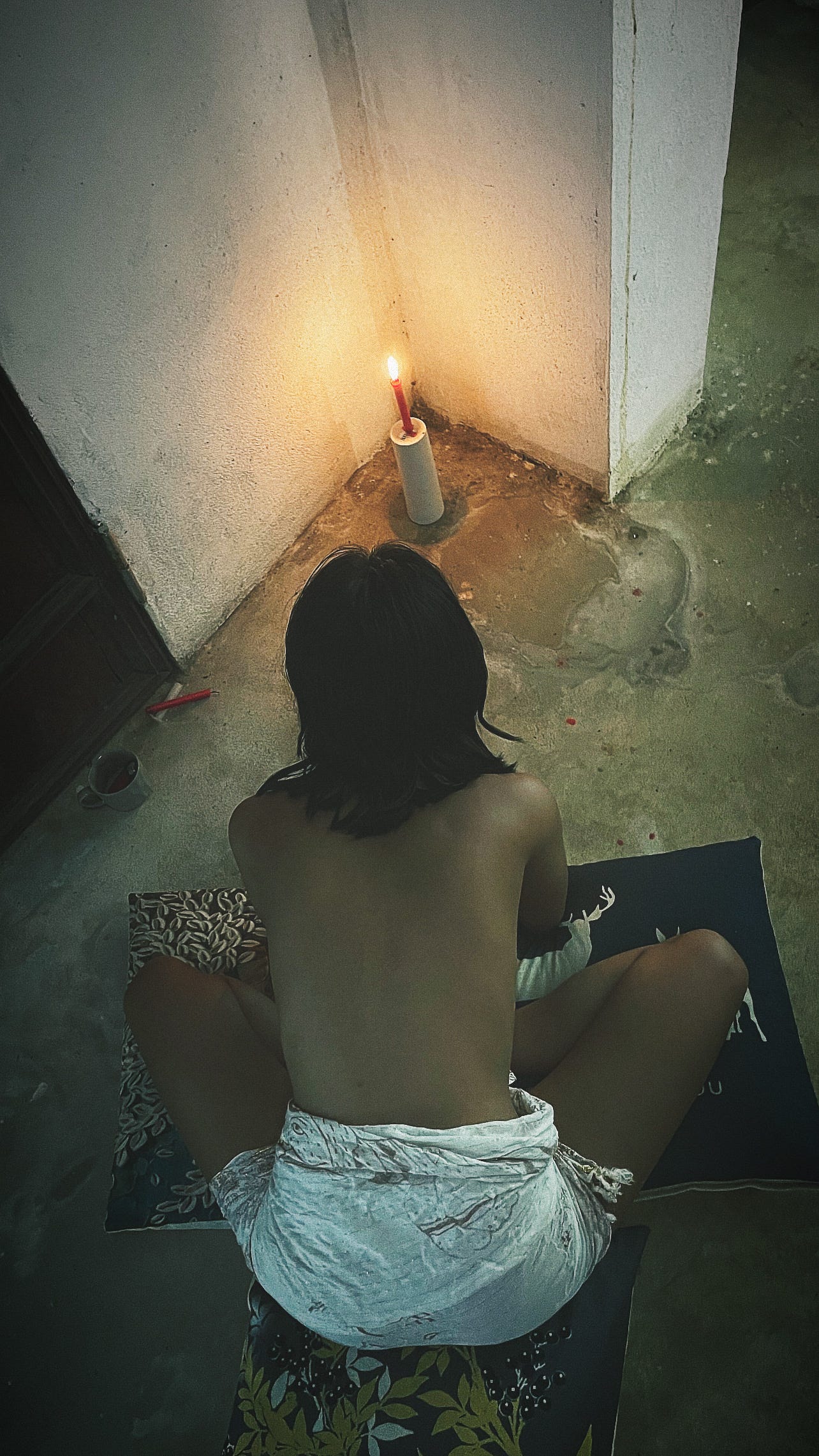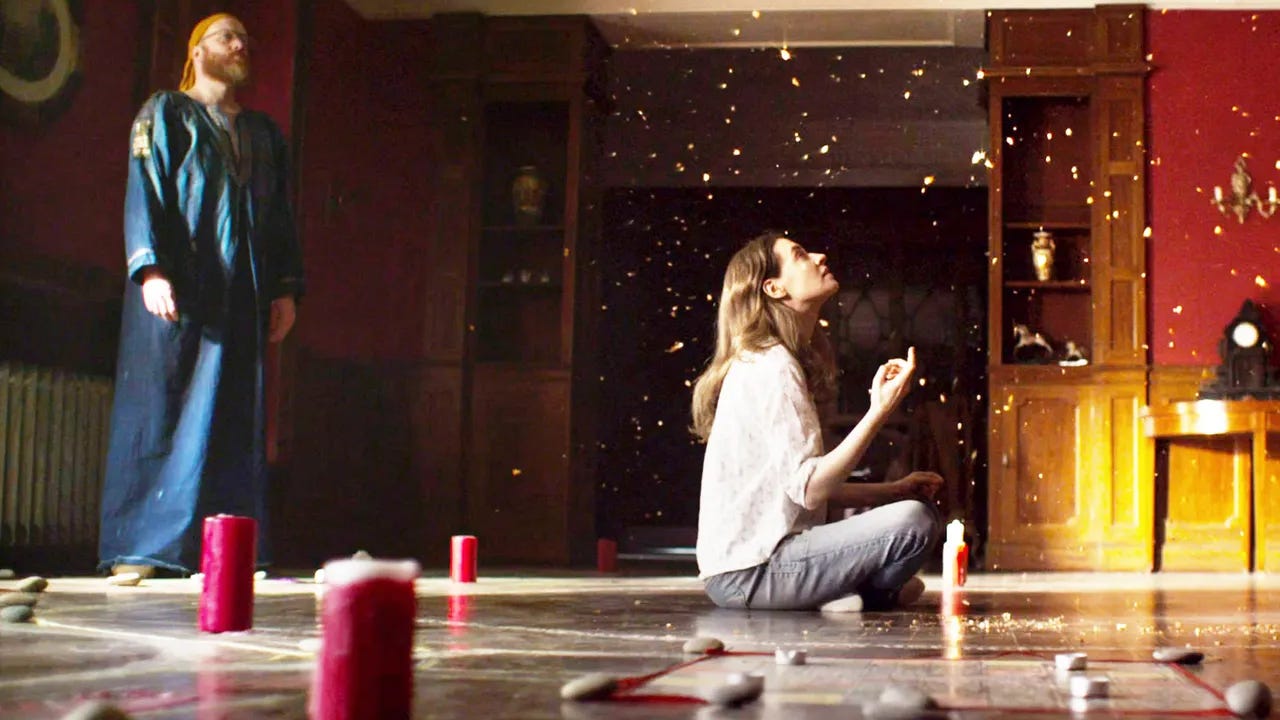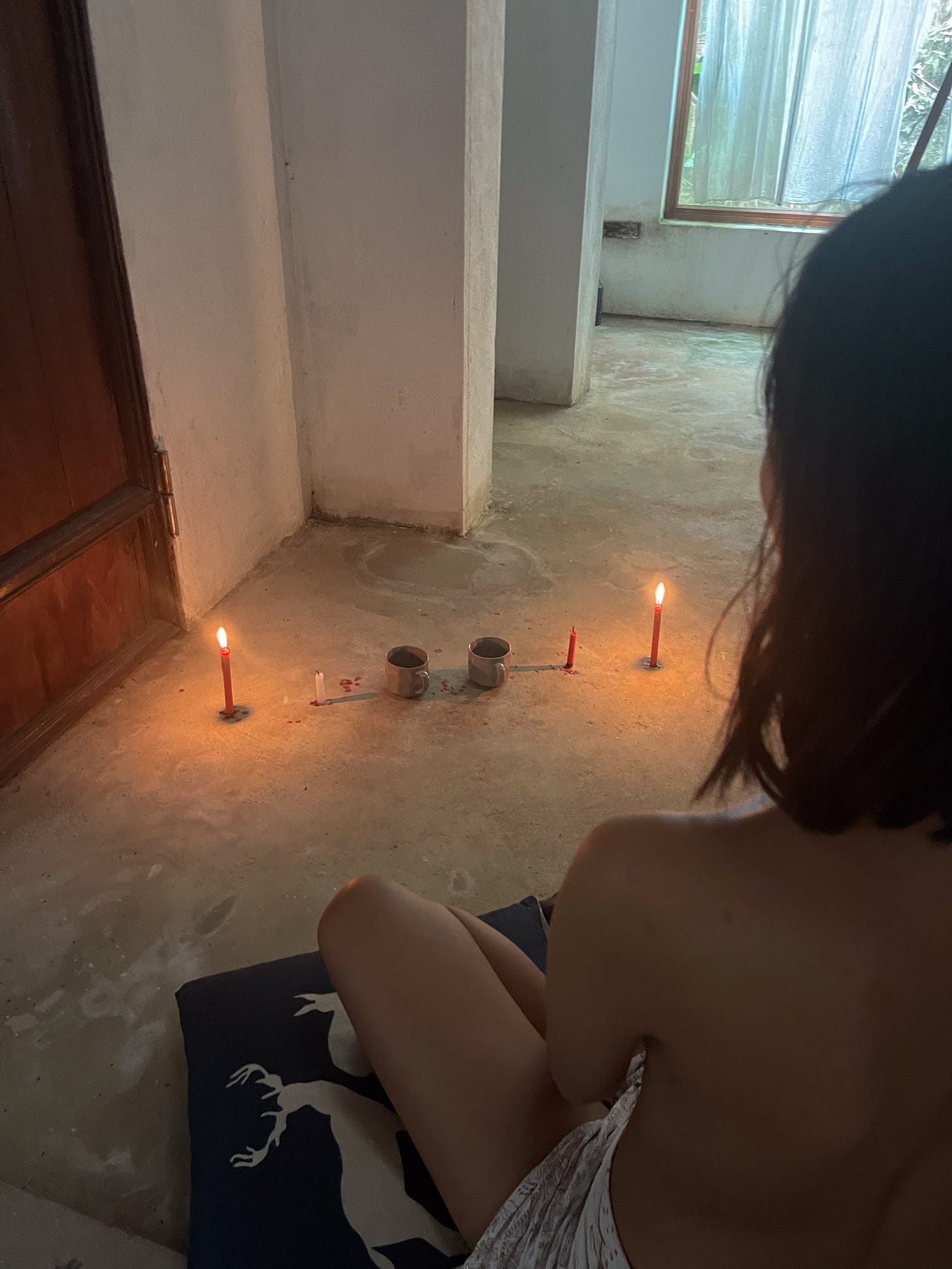In the introspective magical film "A Dark Song," which may only superficially be classified as horror, we witness a relentless spiritual transformation far from a modern "Namaste" culture. Directed by Liam Gavin in 2016, the film is set in the rugged isolation of rural Wales, where Sophia, haunted by the death of her son, hires Joseph Solomon, who initially against his will, leads her through the grueling Abramelin technique. This mystical rite, notorious for its complexity and associated spiritual danger, requires complete seclusion and relentless commitment. The goal of this process is to make contact with one's own guardian angel, but participants often have to confront their darkest shadows.
The atmosphere of the film, heavy with the burden of unspoken stories and the grim texture of a rundown house, heightens the narrative's tension. Each phase of the ritual, meticulously adapted to esoteric traditions, is not just a step toward spiritual contact but a descent into the psychological abyss. Gavin's direction, characterized by stark minimalism and a strong focus on character-based storytelling, emphasizes the profound isolation and introspective torment required by such spiritual undertakings.
The deep irony of "A Dark Song" lies not only in its climaxes but in the transformative journey itself. The ritual, intended as a bridge to the divine, mutates into a harrowing ordeal that reshapes Sophia. Her initial quest for vengeance subtly transforms into a grueling test of her own spiritual and moral boundaries. The narrative starkly portrays how the pursuit of enlightenment or supernatural intervention can compel one to confront uncomfortable truths about oneself and one's desires.Sophia, grieving over the tragic loss of her son, enlists Joseph Solomon, a specialist in spiritual metaphysics, to lead her through an alchemical process in a secluded house in Wales. This Abramelin Operation involves months of strict spiritual exercises aimed at purifying the soul and preparing it for contact with a Holy Guardian Angel, a concept that goes back to mystical practices for obtaining direct, personal divine knowledge. This intense engagement forces Sophia not only to deal with the supernatural but also with her deepest inner grief and unresolved guilt—elements that Joseph warns are crucial for the success of the ritual.
As the ritual progresses, the dynamic between Sophia and Joseph becomes strained under the weight of the ritual's demands and the secrets Sophia holds back. This withholding leads to a series of catastrophic failures that culminate in Joseph's accidental death—a clear expression of the potential dangers such profound spiritual explorations entail. Ironically, Sophia achieves a transformative encounter with her angelic being, not to seek revenge as she originally intended, but to gain the power of forgiveness, a conclusion that profoundly alters her understanding and direction in life.
The film "A Dark Song" shows striking parallels to the transformative experiences facilitated at Forbidden Yoga, where participants engage in profound practices derived from ancient Indian traditions. The goal is similarly profound: to bring about significant personal change without compromise.
Yet, just as Sophia underestimates the demands of the Abramelin, participants often find the depth of introspection and transformation unsettling and beyond their initial expectations. The retreats at Forbidden Yoga ensure safety and guidance, yet challenge participants to confront and integrate their shadows, similar to the psychological processes Sophia undergoes. This integration is crucial for true transformation, which cannot be superficially purchased or controlled but requires a deep, intrinsic commitment to face all truths and embrace them, no matter how disturbing they may be.
The portrayal of the Abramelin Operation and its consequences in the film serves as a vivid allegory for the spiritual and psychological journeys undertaken in such transformative exercises. It highlights the dual nature of deep spiritual practices: they are paths to enlightenment, but also perilous journeys that require respect, courage, and a willingness to face the unforeseen changes in one's psyche.
In essence, both the film and the magical processes led by Michael Wogenburg, head of Forbidden Yoga, enable profound transformation through forgotten spiritual practices, highlighting the transformative power and potential risks of engaging deeply with one's innermost self. The film serves both as a cautionary tale and as an inspiration, showing that true transformation requires navigating the delicate balance between control and surrender in the search for spiritual and psychological wholeness.
magical candle ritual performed in some Forbidden Yoga retreats with select clients
Deep Analysis: "A Dark Song" and the Human Psyche
I. The Setting as a Psychological Labyrinth The setting of the film, a remote house in rural Wales, serves not only as a backdrop but as a psychological labyrinth, a manifestation of Sophia's inner world—a place where the walls reflect her isolation and amplify her torment. This space becomes a crucible for transformation, where the external silence intensifies the inner chaos. Each room used during the Abramelin Operation strategically symbolizes a stage in Sophia's spiritual and psychological confrontation. The house, with its sparse, oppressive atmosphere, serves as a container for the ritual journey, shaping the narrative into a profound engagement with loneliness and existential dread.
II. The Abramelin Operation: A Pathway to Descent The Abramelin Operation, central to the film, is portrayed as a ritual for contacting the divine and also as a harrowing descent into the depths of the psyche. This ritual frees Sophia from her worldly concerns and forces her to confront her darkest fears and desires. It requires purity, complete isolation, and confrontation with one's shadow—a process that runs parallel in psychological theories that emphasize confronting the unconscious to integrate and heal it. The relentless and repetitive nature of the tasks that Sophia must perform under Joseph's strict guidance mirrors the arduous journey of self-exploration and purification one might undergo in deep psychotherapy or during intense spiritual initiations.
III. Sophia and Joseph: Archetypes of the Seeker and the Guide Sophia, a grieving mother, embodies the archetype of the seeker, driven to the edge of reason by her loss, while Joseph represents the archetype of the mystical guide or psychoanalyst. Their relationship is fraught with transference and countertransference, typical of the psychoanalytic dynamic, where emotional and psychological projections are intensely expressed. Joseph's task is to guide Sophia through the spiritual ordeal, but his own flaws and the increasing entanglement of their fates complicate the ritual. The dynamic between them intensifies, showing a battle of wills and intellects, where each tests the other's resolve and capacity for truth.
IV. Confrontation with the Shadow and the Anima/Animus The ritual forces Sophia to directly confront her shadow—her suppressed guilt, anger, and despair. This confrontation is crucial in Jungian psychology, where confronting the darker aspects of oneself is necessary to achieve individuation, the psychological integration that leads to wholeness. Additionally, Sophia's interactions with Joseph and the angelic figure she eventually encounters resonate with Jung's concepts of anima and animus—the feminine and masculine energies within the psyche that must be balanced to achieve psychological maturity.
V. The Irony of Enlightenment Through Darkness The climax of the film, where Sophia finally meets the celestial being, underscores the paradox at the heart of many mystical traditions: enlightenment often comes through a path filled with darkness. Sophia seeks revenge but is granted the power to forgive, suggesting that true spiritual awakening often contradicts our initial intentions. This moment of forgiveness represents a profound transformation of her entire being, achieved only after enduring the ritual's severe trials. It illustrates the Jungian notion that the integration of the shadow leads to an unexpected, often more meaningful outcome than the conscious mind anticipates.
VI. Parallels to Modern Transformative Practices This profound narrative reflects the experiences facilitated at Forbidden Yoga, where ancient and mystical practices are employed to provoke deep personal transformations. Like the Abramelin Operation, the exercises at Forbidden Yoga push participants to confront their innermost fears and desires. However, unlike Sophia's solitary and perilous journey, these modern practices are designed within a framework of safety and guidance, emphasizing the necessity of confronting the self but with support and without the physical dangers presented in the film.
A Reflection on the Nature of Spiritual and Psychological Transformation "A Dark Song" serves as a poignant meditation on the nature of grief, the pursuit of redemption, and the costs of profound spiritual transformation. It offers a vivid portrayal of the psychological depths that ancient rituals tap into and the existential struggles inherent in such transformative processes. The film invites deep reflections on the nature of human suffering, the pursuit of transcendence, and the paradoxical outcomes of such quests—themes that resonate deeply with anyone engaged in the serious study of the human psyche and spiritual practices.
magical candle ritual performed in some Forbidden Yoga retreats with select clients







